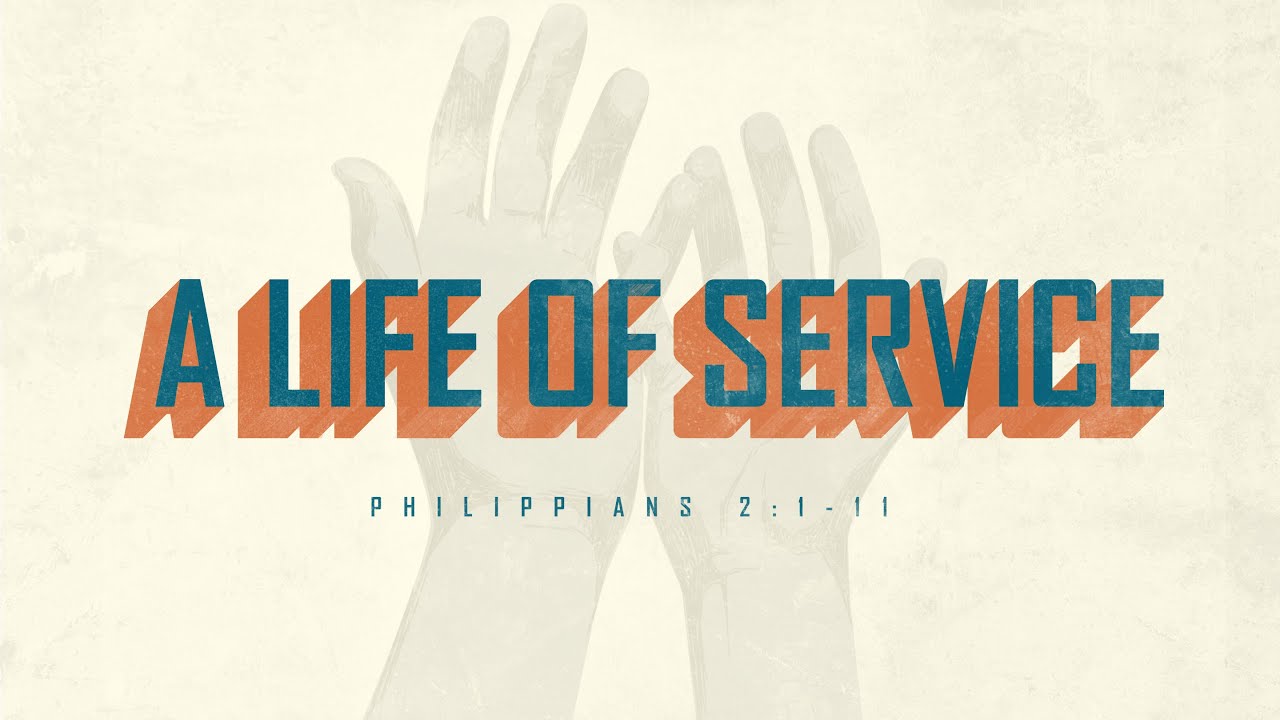View Full Transcript
Episode Transcript
[00:00:00] Speaker A: You.
[00:00:01] Speaker B: Hey, thanks so much for listening to this message. My name is Jason, and I'm one of the ministers here at the Madison Church of Christ. It's our hope and prayer that the teaching from God's words you hear today will bless your life and draw you closer to Him. If you're ever in the Madison, Alabama area, we'd love for you to worship with us on Sundays at 830 or 10:30 A.m.. If you have any other questions about the Bible or want to know more about the Madison Church, find [email protected]. Be sure to also check out our Bible study podcast at Madison Church of Christ bible Studies. Thanks again for stopping by.
[00:00:38] Speaker A: Paul said in Philippians two, as we've been reminded earlier, do nothing from selfish, ambition or conceit, but in humility count others more significant than yourselves. Let each of you look not only to his own interest, but also the interest of others.
Some of the most challenging words in all of Scripture, I think.
Imagine with me that we announced this morning that next week that we would have a footwashing service, that we would pick some people at random, and we'd call you to the front and have some of our ministers and shepherds wash your feet. And so we pick some from this side of the auditorium, some from the middle, some from this side, even in the balcony. We'd pick a few and we'd have you come down and do that next Sunday. What do you think?
Well, first of all, we got one on board. First of all, I know that some of you won't be here next week, and there's some reasons for behind that. Some of you would feel uncomfortable with the footwashing service. Footwashing is something that happened a long time ago. There's not something that we do right now or do now, and so we'd be uncomfortable with that. Others of you would be scared that you would be chosen at random and so you would not be here.
But suppose we did have that. And suppose you decided you were going to come next Sunday. What would you do before worship?
You'd wash your feet, wouldn't you? You would. You'd wash it with the Fruitiest Belling soap that you have. You'd probably put deodorant on them. I don't know what you would do, but we would do something to make sure or most of us would do something to make sure that our feet were as clean and as good smelling as possible. Because the idea of somebody being that up close and personal with our feet is just terrifying for us. But here's the thing. Washing our feet before a footwashing service really defeats the point of footwashing.
We think about why they did this back then, and there actually was a reason for that. Scholars came together and they agree it's because their feet were dirty.
There was a practical purpose behind it. When somebody was invited to somebody's house for a meal. On the way there, they would stop by one of the public bathing places. They would take a bath and then on the way to that person's house, their feet and their sandals would be filthy. They would be on these dusty, muddy roads and so their feet would arrive to the house filthy. And so it was customary for the host of that fancy mill to have a slave there as the guests came in to wash their feet, because they can't do what we can do and put our stinky feet close and under the table so nobody can smell them. No, that's not how they are able to sit at their tables. It was lower to the ground and people would sit on pillows or recline on throws or on a long couch. And so their feet were very close and personal with somebody's head. And so there was a practical purpose behind that footwashing. So we can't really identify with that though, can we? It's not something that we do in 2023. And so let's try this. Imagine with me that instead of footwashing, we announced that the Shepherds over the next couple of weeks are going to come to random houses and that they are going to show up. They'll ring your doorbell, you answer the door and they are there. A couple of them are holding buckets with rags and some cleaning supplies and some scrub brushes and they are there to clean your bathroom.
That's a job nobody wants.
I know some of you are going to come up to me afterward and tell me, well, Jordan, I just love to clean bathrooms. You don't know what it's like. You're right, I don't. But do you really?
Anyway, what would you think if that were going to happen?
There'd be a few responses, I think. First would be from the Shepherd's wives. They would think, well, why can't they start at home?
The second would be from a few of you, at least, to say, well, those bathrooms haven't been cleaned in months and somebody's got to do it, and so why not let them do it? But the rest of us would be mortified, wouldn't we? The idea of someone coming that up close and personal with our toilet, our shower, our sinks, it would be terrifying for us. And so if that were going to happen, we would go home and immediately deep clean our bathrooms and then we still would have an issue with probably letting somebody come and clean them afterwards.
There isn't much modern day significance to washing feet, but there is a spiritual significance to being a servant and living a life of service. And this morning, that's what I'd like to talk about, this question of why do we serve?
We live in a culture that really does a really good job of serving others. It's ingrained in a lot of people today. In fact, statistics back that up. Surveys show that over the last couple of years, over 124,000,000 people ages 16 and up served their neighbor in some form or fashion. In that same survey, over 60 million people said they formally volunteered with an organization.
Our country, our culture really believes in serving others and in reading things about this and trying to understand more of why I kept coming back to this thing. It's a really fancy word called moralistic therapeutic deism. Moralistic therapeutic deism. Stay with me. I know it's a big word, but I feel it's kind of ingrained in our culture, a little bit foreignistic. Therapeutic Deism believes a God exists that created and ordered the world and watches over human life on earth. And God wants people to be good, nice and fair to each other, as taught in the Bible and by most world religions.
The central goal of life, according to this, is to be happy and feel good about oneself. And God does not need to be particularly involved in one's life, except when God is needed to resolve a problem, and then good people go to heaven when they die. You see this idea, it really seems like it has some validity in our culture today. The kind of responses found in these surveys really show an emptiness at the heart of their understanding of God and the ways of God.
It's about providing therapeutic benefits rather than spiritual.
That is, we want to be moral people who do good, and it makes us feel good.
It helps us feel happy, even. It's not about God being involved in our lives per se. It's just being a good person. As we dive into John chapter 13, that's where we will be today. As we dive into John chapter 13, I want you to think and ask yourself this question why do I serve? Why do you serve? So, John, chapter 13. We're going to begin with verse one in just a second. If you want to turn there in your Bibles. This scene we have here in John chapter 13 is the disciples and Jesus in the upper room, and all four Gospels record this time together in different bits and pieces. John, though, has the most information about it, and John actually is the only gospel that records this footwashing scene. So let's begin in verse one.
It was just before the Passover festival. Jesus knew that the hour had come for him to leave this world and go to the Father. Having loved his own who were in the world, he loved them to the end. You see verse one here. It begins this whole passage with the idea of love. It truly sets the tone of everything that's going to happen. Jesus spent his earthly ministry loving people, and he's going to spend the last few moments on this earth loving those that he was closest to. He was going to truly try to show them, as one corinthians calls it, a more excellent way of love. Verse two, the evening mill was in progress and the devil had already prompted Judas, the son of Simon Iscariot to betray Jesus. Notice that the mill was in progress.
This thing that Jesus is going to do here, it was deliberate, it wasn't as the people came in, he got up deliberately to do this. And also notice that verse two gives credit to the devil for the betrayal of Jesus. This act was not conceived in the mind of Judas, but in the mind of Satan, who put it in the heart of Judas.
Verse three jesus knew that the Father had put all things under his power and that he had come from God and he was returning to God. So he got up from the mill, took off his outer clothing, and wrapped a towel around his waist. After that, he poured water into a basin and began to wash his disciples'feet, drying them with a towel that was wrapped around him.
Jesus removes his outer garments to serve them. In that culture, it would have been in great humility to do something like that, even to the point of maybe even embarrassing.
Have you ever gotten secondhand embarrassment?
Somebody is doing something and you're like, well, that's embarrassing, I feel it myself. Well, that maybe even would have been felt by these disciples, because that's how low he was making himself in doing that.
The verse also gives us great insight into why Jesus could humble himself so much. He knew who he was and where he was going. He didn't have to pretend.
He didn't have to put on a show or try to convince somebody else of who he was. He knew he had value and he was from Heaven. He knew he would die and return back to Heaven. That's why he could do this task. It's actually said that rabbis in ancient Judaism were the most humble people. They would do anything for anyone except give up their place at the table.
And Jesus, he goes far, far beyond that.
Luke, in his Gospel, gives us some insight into things that were happening around this time in the room.
Luke shows us that a dispute arose among the disciples and they were debating which one of them was the greatest.
If you look at Matthew, Mark and Luke, it seems that this would have happened right before this scene in the upper room. And if you're like me, I can just imagine me and my brother doing this, having disputing, let's call it what it was probably arguing or what it would have been for me, arguing who's the most important and trying to decide who's going to sit at the right and left of Jesus. So following that, you can imagine how powerful it would have been for Jesus to get up, take off his outer garment, wrap a tallah around him, and do what no one else wanted to do.
It was considered at that time the most menial task. A servant could do.
In fact, it says Jewish slaves could do a lot of things. They could work in the fields, they could cook, they could clean, they could carry stuff. There was a lot of things that Jewish slaves could do. One that they could not do was wash feet.
That was actually left for the Gentile slaves. And even then it was something that the newest slaves had to do. The lowest on the totem pole, they had to do that. Or even maybe if they were being punished, they're the ones that got to wash feet. In that room, Jesus had a group of men that were really concerned about their place at the table.
It was certainly beneath their place to wash feet.
All of them needed their feet washed. None of them were willing to get up, put on a towel and do it.
I wonder, if Jesus had asked them to wash his feet, don't you think they would have jumped at that opportunity?
But to wash the other men there, wash the other feet, that would be to admit that you're the least, not the greatest.
Jesus gets up, wraps a towel around himself, takes that water and basin, and begins to wash feet. And it seems they sit in silence. Don't you know they were shocked?
Verse six, he came to Simon Peter, who said to him, lord, are you going to wash my feet? Jesus replied, you do not realize now what I'm doing, but later you will understand.
No, said Peter, you shall never wash my feet. Jesus answered, unless I wash you, you have no part with me. Then, Lord, Simon Peter replied, not just my feet, but my hands and my head as well. Jesus answered, Those who have had a bath need only to wash their feet. Their whole body is clean.
And you were clean, though not every one of you. For he knew who was going to betray him. And that was why he said, not every one of you was clean. Notice in verse six, peter, true to his nature, has got to say something, doesn't he? He speaks up and says, Lord, are you going to wash my feet?
Jesus tells him, look, you don't understand what I'm doing here, but one day you will. Peter, more persistent, no, you'll never wash my feet, Jesus. Unless I wash you, you have no part with me. And Peter never does anything halfway, does he, Lord? Then wash my head and my hands, too. You see, Jesus here meant so much more than washing feet.
Maybe that Peter couldn't eat a meal with Jesus if he didn't have his feet washed. But Jesus was going far beyond this washing of feet.
A literal foot washing is not necessary before you can be a Christian. But you must be washed free from sin, and that cleansing can only come from Christ.
See, that's when Jesus turns this physical cleanness discussion into a spiritual cleanness discussion. This whole scene of Jesus washing the disciples feet is really foreshadowing what happened about 24 hours later.
Jesus humbly voluntarily gave of Himself on the cross.
He cleansed us not by washing dirty feet or them, by washing dirty feet like he did that night. He cleansed us by doing what was necessary to wash us clean from our sins. And even with that going on, jesus knew that there was someone there in their midst with a pretty dirty, dirty heart.
He knew that Judas was going to betray Him.
Would you have washed Judas'feet?
I would have.
You know, a grill brush is I'd gotten it good.
But I can only imagine how softly and tenderly jesus washed the feet of his betrayer.
Verse twelve, when he had finished washing their feet, he put on his clothes and returned to his place. Do you understand what I have done for you? He asked them. You call me Teacher and Lord, and rightly so, for that is what I am. Now that I, your Lord and Teacher, have washed your feet, you should wash one another's feet. I've set an example that you should do as I have done for you. Very truly I say to you, no servant is greater than his Master, nor is a messenger greater than one who sent Him. Now that you know these things, you're blessed if you do them. You see, after Jesus sits back down, he challenges these men to serve each other in the same manner that he served them. If Jesus the Messiah didn't think it was below Himself to stoop down and wash their feet, they certainly, as his followers, his closest friends, couldn't think it was below them. He said in verse 15, I set an example that you should do as I have done for you. And I think verse 17 really ties in well with this because it's not enough to just hear what should be done or understand what needs to be done, or even approve of what must be done. We got to do what must be done, what needs to be done. We are to live out this footwashing way of life.
And finally, this scene, we're going to skip down to verse 34. It wraps up with this idea of love. Jesus ties such a bow on it here and he says, as I have loved you, you must love one another.
See, this passage begins with love and I think it's no coincidence that it ends in love. Jesus'service in footwashing and at the cross was completely wrapped in love.
So what can we learn from this?
That we need to have footwashing services and have that next Sunday?
Not really.
It would be doing something that's not really needed today.
But maybe the idea of being willing to do something that is needed, no matter how low it makes us, is the purpose behind this. We've got to be careful what we're too good to do. Jesus didn't have that problem.
He knew who he was, the King of Kings, the Lord of Lords. He knew he was sent from God and he would die and return back to the Father. He had no problem bending to wash feet, to be with a child, to be with the sick, even those with leprosy, to be with those that are demon possessed.
He was with so many that normal people didn't want to be with.
He was the Son of God in John chapter twelve, when he came in that triumphant entry and people are shouting hosanna to him.
He's every bit of the same son of God in John chapter 13 when he's washing dirty feet and we need to be confident in who we are, I must realize that I'm a child of the King. When I'm up here preaching to you today and I'm every bit of the same child of the king when I'm taking out trash from a youth event to the dumpster.
What do you do to serve others?
Let me ask that again. What do you do to serve others? Not what should you do, but what do you do?
Are there jobs that you feel like are on your level and jobs that aren't?
Are there jobs that you're just hoping someone else will do that?
When I think of great servants in my life, there are quite a few people that come to mind and I want to tell you about one of them. His name is Larry. Larry Hancock.
Larry grew up in the church in Mobile and Larry, though he quickly fell away as he became an adult, he stayed away from God for a long time actually into his later and, and because of a loving mother that simply needed a ride to church.
And he did it as a good son. He took his mother, Miss Vivian, to church and took her to church and he began to listen. And eventually Larry was restored. And when he was restored back to God, he said this. He said, I got a lot of time to make up for.
And he did that. Larry did very well for himself, financially and all. But for Larry it wasn't about a title.
It wasn't about having the title deacon or shepherd or even being on a committee that made big decisions in the church. He was excited to wash dishes.
He was excited to take out the trash.
He was the guy that loved to go and take communion, to shut ins and to go visit the guests that had been there or visit members who just needed to be with somebody.
He began a ministry to help older people that couldn't help themselves and build things for them and take care of them in ways that they couldn't help themselves.
See, Larry, for him there was no job that was beneath him and that really stood out to me. I want to be more like Larry. Larry was a servant.
There's definitely a difference in choosing to serve and being a servant. When we choose to be a servant, we give up control.
It's not about when and how and what ways we will serve.
It's not about weighing the pros and the cons or writing out that list of should I choose to do this or not. It's simply seeing a need and meeting a need, being a servant.
With that comes vulnerability.
It makes us vulnerable and that's scary and that vulnerability is real. But I need to share with you two truths and a lie about that. Truth number one is that you can give of yourself as a servant and you can do the best job that you possibly can do and you can do a great job at that.
But one day in doing all that, in serving God and serving others, somebody's going to hurt you.
And that's real.
People are imperfect and that's going to happen.
Truth number two is that you can be the greatest servant you possibly could be. Give of yourself and do everything you can for other people and you're going to hurt somebody else.
Again, people are imperfect and you're going to find a way, unfortunately, to hurt people. It's going to happen. But here's the lie. Satan will tell you that it's not worth it. Satan will tell you that you should give up, that serving and getting hurt is for somebody else.
Jesus offers a different way.
Keep washing feet.
See, there's only one position in the kingdom and that's a servant. Preachers are servants, deacons servants.
Shepherds are servants. The best Bible class teacher is a servant. The one that's been a Christian for 50 years or five days is a servant. The richest member, the poorest member, the smartest member in the kingdom is a servant.
It's not about your place in a pecking order because there are no places in the pecking order. Everybody is on the same level as a servant.
If we're a servant, rather than just choosing to serve, it'll change our relationships, it'll change our marriages, it'll change our jobs, our church, our community.
It'll make them all better humbling ourselves. And being a servant changes everything.
But also I want you to think of this, that we got to be willing to accept help from others.
Being too proud to accept help may be as big a problem as being too proud to give help.
It was Peter's pride that could not let Jesus wash him.
It's hard to accept help from others, isn't it? Our pride tells us we need to do it alone.
No help from anyone at any point at any time because I can do it.
When we refuse help, our pride robs other Christians of the joy of being a servant. We need to get over our pride, tell people what we're struggling with. Let them pray for us, let them help us. We need to wash the feet of a figurative sense of those who need washing and at the same time be willing to let others wash our feet when our feet need washing. In my life, sometimes I'm the one that's doing the washing, and sometimes I'm the one whose feet needs washing.
My pride gets in the way of both of those.
Washing feet is not the most humble thing that Jesus ever did.
Philippians two, beginning with verse five. Have this mind among yourselves which is yours in Christ. Jesus, though he was in the form of God, did not count equality with God a thing to be grasped, but emptied Himself by taking the form of a servant, being born in the likeness of men and being found in human form. He humbled Himself by becoming obedient to the point of death, even death on the cross, as we just sang earlier, at the Cross, love ran red.
If we're going to take on the identity of a servant like Jesus, we must be willing to give up our rights, the rights to our own life, and say, as Paul did in Galatians, chapter two, verse 20, I'm crucified with Christ. It's no longer I who live, but Christ who lives in me.
Perhaps today we can make the decision to be more like the servant that Jesus was, to be willing to put on that towel of humility, to serve others in ways they need, at the same time, battle that pride that we have and let others help us.
Sometimes we need our feet washed. Sometimes we need to do the know at Madison. We're really blessed. We're really blessed with incredible servants here that truly have incredible, incredible I know I'm using the incredible word a lot, but really that describes you incredible talents.
God has blessed us here, and what's cool about serving here is you don't have to do it by yourself. And I think if we were to rate our church as a whole, as a church that serves on a scale of one to ten, I think we'd rate ourselves pretty high.
But let's look at ourselves in the mirror.
What about you?
On a scale of one to ten, where are you on that scale?
How would you grade yourself?
What are areas that you're being called to serve in? What are needs that need to be met?
Are there opportunities that you're pushing away? You see, we need to be people who live with eyes wide open, searching for ways to serve others. Jesus was very active in this. He wasn't passive.
He saw a need and met it. We need to do the same.
Choosing to take the identity of a Know. There's some great health benefits that come with that. There are.
It's going to make us happier.
Statistics actually show this, that volunteers have a 29% lower risk of high blood pressure when they serve 17% lower risk of inflammation levels and spend 38% fewer nights in the hospital. That's pretty big.
There's no question that there's some physical and emotional benefits from serving others. But here's the thing. There's so much more significance to it than acting right and feeling good about yourself or looking good. There is spiritual significance to serving others. Mark, chapter ten, verse 45, says, for even the Son of man did not come to be served, but to serve and give his life a ransom for many. You want to know Jesus? You want to be like Jesus?
We got to do is one of my favorite verses is one. John, chapter two, verse six. It says to walk the same way that he Jesus, walked. We got to be like Jesus.
We got to serve others. Jesus was a servant. Serving connects us to our Savior. We take on the form of Jesus and our servant. Identity, like his, should be rooted in love.
Love for God, love for others, continually pointing others to our Savior.
In the same way, let your light shine before others so that they may see your good works and give glory to your Father who is in heaven this morning. Maybe you need to be washed like Peter, like Jesus talked about with Him, that maybe you need to be cleaned. We can do that in the waters of baptism. That cleansing comes from Christ and the blood that was shed from Him. And we could do that this morning. But maybe you need your feet washed.
Maybe you need some help.
Maybe you need some prayers, and we want to do that with you.
Or maybe you're looking for a way to jump in, give up control and say, I'm ready to serve. I'm ready to be a servant.
We want to help you do that, and we want you to join in with this family. There's a lot of great things going on here, and we want you to be a part of it. There are going to be shepherds at each of these entrances, exits, and if we can help you in any way, you can come down here and we'll pray for you and be there with you and wash your feet and you help us wash others. Whatever we can do for you, let's stand.





